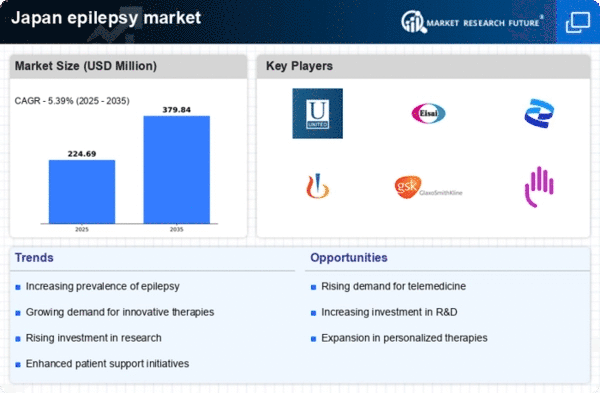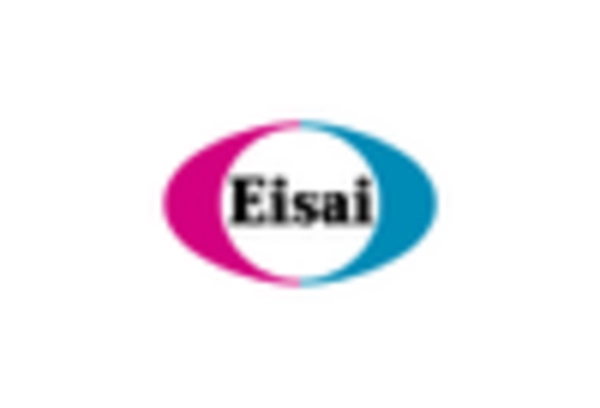Increasing Prevalence of Epilepsy
The rising incidence of epilepsy in Japan is a crucial driver for the epilepsy market. Recent estimates suggest that approximately 1 in 200 individuals in Japan are affected by epilepsy, translating to around 600,000 people living with the condition. This growing patient population necessitates enhanced healthcare services and treatment options, thereby stimulating market growth. The increasing prevalence is attributed to various factors, including genetic predispositions and environmental influences. As awareness of epilepsy expands, more individuals are likely to seek medical attention, further driving demand for innovative therapies and management solutions within the epilepsy market. Consequently, healthcare providers and pharmaceutical companies are focusing on developing targeted treatments to address the specific needs of this demographic, which may lead to a more robust market landscape in the coming years.
Government Initiatives and Funding
Government initiatives aimed at improving healthcare access and funding for epilepsy research play a pivotal role in shaping the epilepsy market in Japan. The Japanese government has implemented various programs to enhance the quality of care for epilepsy patients, including subsidies for medications and support for specialized clinics. In recent years, funding for epilepsy research has increased, with the government allocating approximately ¥2 billion annually to support studies focused on treatment advancements and patient care. These initiatives not only improve patient outcomes but also encourage pharmaceutical companies to invest in the development of new therapies. As a result, the epilepsy market is likely to experience growth driven by increased research and development activities, ultimately leading to more effective treatment options for patients.
Technological Innovations in Treatment
Technological advancements in treatment modalities are significantly influencing the epilepsy market in Japan. Innovations such as responsive neurostimulation and advanced surgical techniques have emerged as viable options for patients with drug-resistant epilepsy. The introduction of wearable devices that monitor seizure activity is also gaining traction, providing patients and healthcare providers with valuable data for better management of the condition. The market for these technologies is projected to grow at a CAGR of approximately 8% over the next five years, reflecting the increasing demand for effective and personalized treatment solutions. As these technologies continue to evolve, they are expected to enhance the quality of life for patients while simultaneously driving growth within the epilepsy market.
Rising Demand for Personalized Medicine
The shift towards personalized medicine is becoming increasingly prominent within the epilepsy market in Japan. Patients are increasingly seeking tailored treatment plans that consider their unique genetic and phenotypic characteristics. This trend is supported by advancements in pharmacogenomics, which allow for more precise medication selection based on individual responses. As a result, pharmaceutical companies are investing in research to develop personalized therapies that cater to specific patient profiles. The market for personalized medicine in epilepsy is anticipated to expand, with projections indicating a growth rate of around 10% annually. This demand for customized treatment options is likely to reshape the landscape of the epilepsy market, fostering innovation and improving patient outcomes.
Growing Focus on Mental Health and Comorbidities
The recognition of the interplay between epilepsy and mental health conditions is increasingly influencing the epilepsy market in Japan. Studies indicate that nearly 50% of individuals with epilepsy experience comorbid psychiatric disorders, such as anxiety and depression. This growing awareness has prompted healthcare providers to adopt a more holistic approach to treatment, integrating mental health support into epilepsy care. As a result, there is a rising demand for comprehensive treatment plans that address both seizure management and mental health needs. This trend is likely to drive the development of new therapeutic options and support services within the epilepsy market, ultimately enhancing the overall quality of care for patients.
















